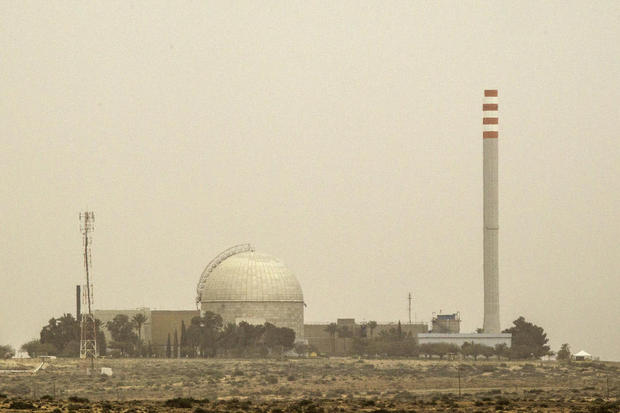Non-Proliferation Talks Fail over Mideast Nuclear-Weapons Free Zone Plan
WEAPONS OF MASS DESTRUCTION, 25 May 2015
Carole Landry – Middle East Eye
23 May 2015 – United States, Canada and Britain opposed a plan to set up a nuclear weapons-free zone in the Middle East.

A picture taken on March 8, 2014 show a partial view of the Dimona nuclear power plant in the southern Israeli Negev desert. AFP PHOTO / JACK GUEZ
Nuclear non-proliferation talks ended without agreement on Friday [22 May 2015] after the United States, Canada and Britain opposed a plan to set up a nuclear weapons-free zone in the Middle East.
More than 150 countries took part in a month-long conference reviewing the nuclear Non-Proliferation Treaty (NPT), which seeks to prevent the spread of nuclear weapons and technology.
But talks on a final document outlining an action plan for the next five years hit a wall over a provision on convening a conference by March 2016 on creating a Middle East nuclear-weapons free zone.
Israel, which is not a member of the NPT but attended the conference as an observer, opposed the proposal backed by Egypt and Arab countries.
Israel is believed to be the only country that possesses a nuclear arsenal in the region, although it has never acknowledged its nuclear military capacity.
US Arms Control Under Secretary Rose Gottemoeller told the NPT conference that provisions on holding the conference were “incompatible with our long-standing policies”.
Gottemoeller argued that the proposed nuclear-free zone did not stand a chance of success “absent the consent of all states involved”, a clear reference to Israel’s opposition.
Earlier this week, the US administration had dispatched an envoy to Israel to discuss the proposal, hoping to reach a compromise that would have salvaged the final document of the NPT conference.
US blames Egypt
Gottemoeller took aim at “a number of states, in particular Egypt” for the failure of the talks, accusing them of refusing to “let go of unrealistic and unworkable conditions” to create the nuclear weapons-free zone.
The head of the British delegation to the talks, Matthew Rowland, also said the terms for convening the conference on the nuclear weapons-free zone were “a stumbling block for us”.
Canada said it could not agree to the document because of the provisions that would have laid the groundwork for creating the zone banning all nuclear weapons in the Middle East.
In an eleventh-hour move, Iran, which heads the Non-Aligned Movement, requested more time to consider the final document but the session resumed with no agreement.
Iran’s envoy cited the refusal of “three delegations” to agree to the final text, accusing them of blocking the consensus “with this high cost”.
The envoy said this was “only to safeguard the interest of a particular non-party to the treaty that has endangered peace and security in the region by developing a nuclear capability”.
At the last NPT conference in 2010, a final document called for the conference on the nuclear-free weapons zone for the Middle East to be held in 2012, but that meeting never materialised.
The NPT, which entered into force in 1970, has 190 state-parties or entities that meet every five years to take stock of progress in nuclear disarmament.
The treaty is seen as a grand bargain between the five nuclear powers and non-nuclear states which agreed to give up atomic weapon ambitions in exchange for disarmament pledges.
But non-nuclear states have been increasingly frustrated by the slow pace of disarmament and had sought during the month-long conference to press for action to speed up the reduction of stockpiles.
Go to Original – middleeasteye.net
DISCLAIMER: The statements, views and opinions expressed in pieces republished here are solely those of the authors and do not necessarily represent those of TMS. In accordance with title 17 U.S.C. section 107, this material is distributed without profit to those who have expressed a prior interest in receiving the included information for research and educational purposes. TMS has no affiliation whatsoever with the originator of this article nor is TMS endorsed or sponsored by the originator. “GO TO ORIGINAL” links are provided as a convenience to our readers and allow for verification of authenticity. However, as originating pages are often updated by their originating host sites, the versions posted may not match the versions our readers view when clicking the “GO TO ORIGINAL” links. This site contains copyrighted material the use of which has not always been specifically authorized by the copyright owner. We are making such material available in our efforts to advance understanding of environmental, political, human rights, economic, democracy, scientific, and social justice issues, etc. We believe this constitutes a ‘fair use’ of any such copyrighted material as provided for in section 107 of the US Copyright Law. In accordance with Title 17 U.S.C. Section 107, the material on this site is distributed without profit to those who have expressed a prior interest in receiving the included information for research and educational purposes. For more information go to: http://www.law.cornell.edu/uscode/17/107.shtml. If you wish to use copyrighted material from this site for purposes of your own that go beyond ‘fair use’, you must obtain permission from the copyright owner.
Read more
Click here to go to the current weekly digest or pick another article:
WEAPONS OF MASS DESTRUCTION: